

Course Outline
“Targeted Drug Discovery” is the first interactive workshop in Greece focusing on the Drug design and development pipeline aiming to integrate all the related topics from structure-based drug design to preclinical evaluation.
Drug Discovery is a multi-stage process that requires concerted efforts by researchers working at the interface of scientific disciplines. The challenge of the design and development of new targeted drugs has a vast socioeconomic impact, especially in the era of personalized medicine.
The workshop provides training lectures and practical sessions in the following fields:
(a) Structure based drug design including structural biology (X-ray protein crystallography, bioNMR spectroscopy) and modern in silico tools (Virtual screening, MD simulations).
(b) Synthesis and structure elucidation of organic –putative bioactive- compounds including novel synthetic schemes, use of new catalysts, spectroscopic and spectrometric techniques, etc.
(c) Biological evaluation of new compounds using biochemical as well as cellular and molecular biology methods.
(d) Customized therapeutics, through identification and evaluation of associated predictive biomarkers
The “Targeted drug discovery" workshop is directed to young scientists/researchers (graduate and post-graduate students, PhD students), post-doctoral fellows, as well as to experienced scientists/researchers from academia and industry with a background in Chemistry, Pharmacy, Biology, Medicine and Biotechnology.
Lectures and practicals will be given by researchers from the Institute of Biology, Medicinal Chemistry and Biotechnology/NHRF and renowned scientists from European research institutions and pharmaceutical companies.
Applicants may submit an abstract for a poster presentation.
The number of participants will be limited. The selection process will be made by a Scientific Committee, following a thorough assessment of the application and the CV of the candidates.
The course will be taught in English.
Participants will receive a certificate of attendance.
Deadline, documents and method of submission
Candidates are invited to submit their application online.
Deadline for application: NEW DATE > 11 September 2016.
Applicants will be informed of the selection results by e-mail by September 14, 2016. Along with the confirmation, they will also receive further information on how to complete the registration process.
Registration Costs
The fee is to be paid after the confirmation of acceptance has been received and the latest by September 22, 2016. Fees include tuition for the Workshop, related material, a welcome reception, coffee breaks and daily light lunch. Participants are individually responsible for their transportation, accommodation and living expenses.
Cancellation/fee policy
Non attendance on the day or cancellations made after September 26, 2016 will not be refunded.
Advanced programme
Monday, October 10th
Thematic Area I: Drug Discovery. Academic and Industrial points of view
Chairpersons: A. Pintzas - P. Zoumpoulakis - D. Mitsiou
08.30 - 09.30 |
Registration |
09.30 - 10.00 |
Opening remarks DR VASSILIS GREGORIOU, NHRF Director & Chairman of the Βoard |
10:00 - 10.45 |
Drug discovery and development – An academic point of view |
10.45 - 11.30 |
Drug discovery and development – An industrial point of view. The case of 11betaHSD1 inhibition |
11.30 - 12.00 |
Coffee Break |
12.00 - 12.45 |
Drug discovery and development – An industrial point of view. The case of DGAT-1 inhibition |
12.45 - 13.30 |
Monocyte and macrophages in immune tolerance and training |
13.30 - 14.30 |
Lunch break |
14:30 - 18:30 |
Practical Session I |
19:00 |
Welcome reception |
Tuesday, October 11th
Thematic area II. Rational Drug Design
Chairpersons: M.Zervou - E. Chrysina - P. Zoumpoulakis
09.00 - 09.45 |
Fragment based drug discovery – Challenges and practical considerations |
09.45 - 10.30 |
Systems biology of mouse pluripotent stem cells |
10.30 - 11.15 |
Computer-aided drug design for discovering novel anti-cancer agents |
11.15 - 11.45 |
Coffee Break – Poster Session |
11.45 - 12.30 |
The role of structural biology in drug design: the power of X-ray crystallography |
12.30 - 13.15 |
Modern NMR spectroscopy towards hit identification |
13.15 - 14.00 |
In silico tools in drug design |
14.00 – 15.00 |
Lunch break |
15.00 - 17.30 |
Practical Session II |
17.30 - 18.30 |
Visit IBMCB infrastructures (NMR, X-ray) |
Wednesday, October 12th
Thematic area III: Medicinal Chemistry in Drug Discovery
Chairpersons: I.Kostas - T.Calogeropoulou - M. Koufaki
09.00 - 09.45 |
Epigenetics and epigenetic drugs: emerging next generation cancer therapeutics |
09.45 - 10.30 |
Dendrimers: Synthesis, properties & biomedical applications |
10.30 - 11.15 |
Thalidomide, Ikaros and Aiolos: from tragedy to therapy |
11.15 - 12.15 |
Coffee Break – Poster Session |
12.15 - 13.00 |
Lipid signaling pathways: opportunities for the discovery of new medicinal agents |
13.00 - 13.45 |
The path to discovery of an antiparasitic drug lead with broad spectrum activity against trypanosomatidic infections |
13:45 - 14:45 |
Lunch break |
14:45 - 18:30 |
Practical Session III |
Thursday, October 13th
Thematic area IV: Biological evaluation
Chairpersons: S. Gonos - V. Zoumpourlis - D. Mitsiou
09.00 - 09.45 |
Use of proteasome activators as novel anti-aging agents |
09.45 - 10.30 |
What can we learn from model organisms? The paradigm of the nematode C. elegans |
10.30 - 11.15 |
The genetic basis of cancer and the xenograft assessment of anticancer drug development |
11.15 - 11.45 |
Coffee Break – Poster Session |
11.45 - 12.30 |
Steroid receptors in targeting drug discovery: the example of glucocorticoid receptor |
12.30 - 13.15 |
Targeted therapies, from bench to bedside |
13.15 - 14.00 |
Pathway analysis tools for drug discovery: applications in liver cancer, cartilage degeneration, and melanoma |
14.00 - 15.00 |
Lunch break |
15.00 - 18.30 |
Practical Session IV |
Friday, October 14th
Thematic area V: Personalized therapeutics - Biomarkers
Chairpersons: M. Alexis - A. Chatziioannou - A. Pintzas
09.00 - 09.45 |
Prognostic markers and therapeutic targets in breast cancer: the case of estrogen receptors |
09.45 - 10.30 |
Precision medicine for targeted drugs of the EGFR-RAS-BRAF pathway |
10.30 - 11.15 |
Envisaging targeted therapeutic approaches through a rational framework for intelligent pharmacogenomic analysis |
11.15 - 11.45 |
Coffee Break |
11.45 - 12.30 |
PARP inhibitors in homologous recombination deficient and proficient ovarian cancer
KOULIS YANNOUKAKOS NCSR Demokritos, Athens, Greece |
12.30 - 13.30 |
Presentations of selected posters |
13.30 - 14.00 |
Closing remarks |
14.00 - 14.45 |
Lunch |
Registration & Abstract Submission
The “Targeted drug discovery" workshop is directed to young scientists/researchers (graduate and post-graduate students, PhD students), post-doctoral fellows, as well as to experienced scientists/researchers from academia and industry with a background in Chemistry, Pharmacy, Biology, Medicine and Biotechnology.
Candidates are invited to submit their application online.
Applicants will be informed of the selection results by e-mail by September 14, 2016. Along with the confirmation, they will also receive further information on how to complete the registration process.
Applicants may submit an abstract for a poster presentation, however abstract submission is optional.
Guidelines for Abstract Submission
General Information & Deadlines
Abstract Formating
Instructors
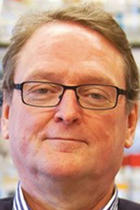
HENK STUNNENBERG
Institute for Molecular Life Sciences, Radboud University, The Netherlands
Henk Stunnenberg is full professor and head of the Department of Molecular Biology and Director of the Radboud Institute for Molecular Life Sciences of the Science faculty at Radboud University, Nijmegen. His research aims at unraveling the molecular basis of development and differentiation emanating from the genome and epigenome in the context of health and disease with emphasis on cancer. State-of-the-art technological developments are applied ranging from single molecule studies through to genome wide elucidation of genetic and epigenetic pathways and mechanisms. The lack of a quantitative framework around the dynamics of the epigenome and its determinants represents a major hurdle for the translation of epigenetic observations into regulatory models, for the identification of associations between epigenotypes and diseases and the subsequent development of new classes of compounds for their prevention and treatment. He is the coordinator of BLUEPRINT that aims at generating at least 100 reference epigenomes and studying them to advance and exploit knowledge of the underlying biological processes and mechanisms in health and disease. BLUEPRINT focuses on distinct types of haematopoietic cells from healthy individuals and on their malignant leukaemic counterparts. Recent research focused on human circulating blood monocyte epigenetic programming in immunotolerance and training. H.G. Stunnenberg is member of EMBO, chairman of Scientific Steering Committee of the International Human Epigenome Consortium (IHEC), member of Scientific Advisory Board of Human Frontier Science Program Organization (HFSPO), Program Committee member for the International Cancer Genome Consortium (ICGC) and for the International Cancer Epigenetics Initiative AHEAD.
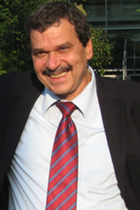
ATHANASSIOS GIANNIS
Institute of Organic Chemistry, Leipzig University, Germany
Athanassios Giannis is a chemist and physician. He was born in Drama / Greece in 1954 and studied chemistry from 1972 to 1980 and medicine from 1978 to 1987 at the University of Bonn / Germany. He completed his Diploma Thesis in 1980 with Manfred T. Reetz and his PhD in 1986 with Konrad Sandhoff. He habilitated in 1992 at the University of Bonn in Organic Chemistry and Biochemistry. From 1998 to 2002 he was Associate Professor at the University of Karlsruhe. Since 2002 he has been Full Professor for Organic Chemistry and Natural Products Chemistry at the University of Leipzig / Germany. His area of research is biological and medicinal-oriented organic chemistry. His research interests are Cell Signaling, Epigenetics, Nucleoside-analogues, Artemisinins, Immunomodulatory drugs (IMiDs), Angiogenesis, Synthesis of bioactive Natural Products, Alkaloids, Carbohydrates, Sialic Acids, Sphingolipids, Peptidomimetics; Inhibitors of Receptor Tyrosine Kinases(RTK), ATP analogues, Kinesine-Inhibitors, Inhibitors of Histone- modifying enzymes. He has 150 publications, over 4500 citations in the literature and h-Factor:37.
Full CV: https://org.chemie.uni-leipzig.de/institut-fuer-organische-chemie/ak-giannis/
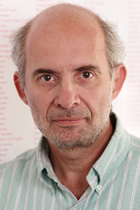
SPIROS LINARDOPOULOS
Institute of Cancer Research, UK
Dr Spiros Linardopoulos joined the Institute of Cancer Research in London-UK as Team Leader in September 2000. Dr Linardopoulos has extensive experience in industrial and academic experimental cancer therapeutics and cancer cell biology, focused on target validation, drug discovery and development.
Dr Linardopoulos directing the discovery and the development of a strategy for treatment of cancer using selective small molecule drugs. He led two programs that delivered preclinical development candidates to enter Phase I clinical trials: MPS1/TTK and FLT3/Aurora inhibitors. Currently, his focus is to further investigate cell cycle control and aneuploidy in order to identify and validate regulators as targets for cancer therapy. In 1997, Dr Linardopoulos joined Onyx Pharmaceuticals, Richmond, CA, USA as a Scientist and Project Leader. During his time at Onyx he determined the mechanisms of action for several small molecule inhibitors and guided the development of selected targets as therapeutic drugs. Before his move to the USA, Dr Linardopoulos was awarded a Marie Curie Research Fellowship from the European Community and completed three years as a postdoctoral fellow at the Beatson Institute for Cancer Research, Glasgow, UK in the laboratory of Genetics and Chemical Carcinogenesis (1993-1997).
Dr Linardopoulos received his undergraduate degree in Chemistry at the Moscow State University and his graduate studies in the laboratory of Biotechnology at the National Hellenic Research Foundation and obtained his PhD in Cellular and Molecular Biology from the Faculty of Biology at University of Athens, Greece (1989-1993).
Full CV: http://www.icr.ac.uk/our-research/researchers-and-teams/dr-spiros-linardopoulos

DOMINIC TISI
Astex Pharmaceuticals, UK

OLIVIER VENIER
Sanofi Pharmaceuticals, France
Olivier Venier is project and team leader at Sanofi R&D in the Integrated Drug Discovery department at Chilly Mazarin France, the R&D headquarter. He is in Sanofi group since 1998 and participated to several research projects within different therapeutic departments: Internal Medicine, Metabolism, Oncology, Cardiology … He worked in various classes of therapeutic targets GPCR (Orexin), Kinases (AMPK), Enzymes (PDE5, 11bHSD1, DGAT) and delivered preclinical candidates. His teams are currently dedicated to the hit to lead phase and to the production of high quality compounds. The methodologies used for generation of hits are state-of-the-art technics and include biophysical screening (NMR, SPR, DSF…), fragment screening but also classical HTS and rescafolding strategies. The multiparametric optimization is used as a key strategy for the construction of highly valuable leads which potentially can conduct to preclinical candidates. The different projects are supported with structural biology and in-silico techniques for the most rational drug design approach. Olivier also provides his expertise at the European Commission, Research Executive Agency as member of Marie-Sklodowska-Curie Individual postdoctoral fellowship chemistry panel and participates in the evaluation of Innovative Training Network proposals.
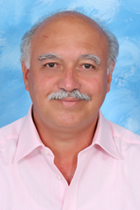
GEORGE KOKOTOS
Department of Chemistry, University of Athens, Greece
George Kokotos is Professor of Organic Chemistry and Director of the Organic Chemistry Laboratory at the National and Kapodistrian University of Athens, Greece. He is currently the Chairman of the Department of Chemistry at the University of Athens. He studied chemistry in the University of Athens, from where he has also obtained his PhD. He then conducted postdoctoral research in the Department of Pharmaceutical and Biological Chemistry in the University of London. He has served as Director of the Institute of Organic and Medicinal Chemistry at the National Hellenic Research Foundation and as Visiting Professor in the Department of Pharmacology and the Department of Chemistry and Biochemistry in the University of California at San Diego. He has authored over 140 publications in peer-reviewed journals and edited two books on Bioactive Lipids and Lipases and one book on Bioactive Peptides. He is also inventor in more than 12 international patents. His research interests include the design and synthesis of bioactive compounds, in particular enzyme inhibitors for the treatment of inflammatory and autoimmune diseases, development of new organocatalysts and applications of high resolution mass spectrometry in lipidomics. He is member of the European Commitee, Division of Organic Chemistry (European Association of Chemical and Molecular Sciences, EuCheMS) (2008 – now) and member of the Editorial Board of “Current Organic Chemistry”, “Molecules” and “Frontiers in Chemical Biology”.
Full CV: http://users.uoa.gr/~gkokotos/
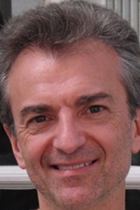
ARISTOTELIS BAMIAS
School of Medicine, University of Athens, Greece
Aristotelis Bamias, MD, PhD, is Professor at the Medical School, University of Athens, in Greece. He studied Μedicine in the Medical School of the University of Athens and trained in Ιnternal Μedicine and Μedical Οncology in the United Kingdom, at the Hammersmith, Royal Marsden and St Bartholomew’s Ηospitals in London. Professor Bamias successfully completed his thesis at the University of Athens and subsequently obtained a PhD from the University of London, working on the application of monoclonal antibodies to cancer diagnosis and treatment. He served as Lecturer in Medical Oncology at the University of London. He is now a practicing medical oncologist in Greece and is affiliated with the Department of Clinical Therapeutics of the University of Athens at the Alexandra Hospital in Athens.
Professor Bamias is in charge of the laboratory of the Oncology Unit, Department of Clinical Therapeutics, University of Athens and he was the coordinator of the genito-urinary working group of the Hellenic Cooperative Oncology Group (HECOG) for the last 10 years. He also was the representative of HECOG at the European Network Gynaecological Oncological Trial Groups (ENGOT) for the last 3 years. Professor Bamias is a founding member and was the first President of the Directing Committee of the Hellenic Genito-Urinary Cancer Group (HGUCG). He is a member of the International Metastatic Renal Cell Carcinoma Database Consortium (IMDC) and the Retrospective International Study of Cancers of the Urothelial Tract (RISC) Investigators.
Professor Bamias is a member of the Royal College of Physicians (MRCP, UK), full member of the European Society for Medical Oncology (ESMO), the American Society of Clinical Oncology (ASCO), the European Society of Gynaecological Oncology (ESGO), the European Society of Translational medicine (EUSTM) and a certified member of the Academy of Translational Medicine Professionals (ATMP). He is also currently a member of the ESMO Faculty for Genitourinary Cancer. His main research focus in oncology is urogenital and gynaecological tumours. A member of several international advisory boards and steering committees of international trials, he has led numerous national and international, industry-sponsored and IIR studies and he has published more than 200 original papers and reviews in peer-reviewed journals with more than 6000 citations by other authors.

DRAKOULIS YANNOUKAKOS
Molecular Diagnostics Laboratory, NCSR Demokritos
Dr Drakoulis Yannoukakos, is the Director of Molecular Diagnostics laboratory at the NCSR Demokritos. He studied at Aristotle University of Thessaloniki where he obtained his Bachelor in Chemistry and then obtained a Ph.D. in Biochemistry from the Université de Paris XII in France. He was trained as a Post-doctoral fellow in the Department of Molecular Medicine, Beth Israel Hospital, Harvard University Medical School (1991-1994) and later on in the Department of Molecular Pharmacology, New York University Medical School (1994-1995).
His research in Cancer Genetics focuses on the analysis of hereditary cancer syndromes such as Hereditary Breast-Ovarian Cancer, Lynch syndrome, Li-Fraumeni, Peutz-Jeghers and others. He is using targeted and exome sequencing in order to identify new cancer predisposing alleles.
He has co-authored 101 peer-reviewed scientific publications with most of them being related to Cancer Genetics. He has served as a reviewer of international research journals (e.g. Nature Genetics) and funding agencies. He has received grants from the Greek General Secretariat of Research and Technology, the Ministry of Health, the Hellenic Cooperative Oncology Group, the Hellenic Society of Medical Oncologists, the Association of Women with Breast Cancer “Alma Zois” and the European Community. He participates at major international consortia such as Consortium of Investigators of Modifiers of BRCA1 and BRCA2, Breast Cancer Association Consortium, Evidence-based Network for the Interpretation of Germline Mutant Alleles and Ovarian Cancer Association Consortium.
Dr Yannoukakos has taught graduate courses of Human Molecular Genetics at the Department of Medicine University of Thessaly and the Department of Biology, University of Athens. He is presently directing a research group of approximately 12 researchers.
Full CV: http://www.ipretea.demokritos.gr/file/cv%20yannoukakos%20last_doc%281%29.pdf

ZOE COURNIA
Biomedical Research Foundation Academy of Athens, Greece
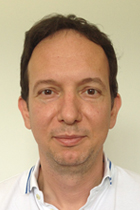
LEONIDAS ALEXOPOULOS
School of Chemical Engineers, NTUA, Greece
Leonidas Alexopoulos is an assistant professor at National Technical University of Athens (Systems Bioengineering Lab) and founder of Protavio (formerly known as ProtATonce), a systems pharmacology SME. His research combines pathway analysis tools and novel multiplex assays for early drug discovery. Dr Alexopoulos received his PhD from the department of Biomedical Engineering at Duke University in 2004 and subsequently he attended MIT (Dept of Biological Eng) and Harvard Medical School (Dept of Systems Biology) for his postdoctoral research. He has strong publication record and he collaborates with major pharmaceutical companies including Roche, Becton & Dickinson, Vertex, Pfizer, and Boehringer-Ingelheim in the area of systems biology for drug discovery.
Full CV: https://ntuabiolab.wikispaces.com/Leonidas+Alexopoulos
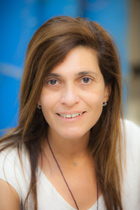
MARIA ZERVOU
Institute of Biology, Medicinal Chemistry and Biotechnology, NHRF, Greece
Full CV: http://www.eie.gr/nhrf/institutes/iopc/cvs/cv-zervou-en.pdf
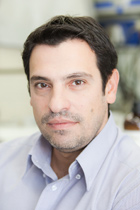
PANAGIOTIS ZOUMPOULAKIS
Institute of Biology, Medicinal Chemistry and Biotechnology, NHRF, Greece
Panagiotis Zoumpoulakis is a Researcher at the Institute of Biology, Medicinal Chemistry and Biotechnology of the National Hellenic Research Foundation (NHRF). He holds a diploma (1999) and a PhD (2004) in Chemistry from the University of Patras and an MBA from Athens University of Economics and Business (AUEB) (2007). His research background is focused on the discovery of bioactive compounds using advanced in silico methodologies (pharmacophore modeling, virtual screening, Molecular Dynamics simulations) complemented with analytical techniques mainly NMR and LC-MS. His work is focused on several therapeutic targets including GPCRs (i.e. AT1 receptor) and enzymes (microbial CYP51, HIV PR, tyrosinase) generating high affinity hits. Additionally his research focuses on the identification of bioactive compounds in natural products using state-of-the art analytical techniques and methodologies. He has a total of 65 publications and review articles in international scientific journals; he has participated in 15 national and European competitive programmes and has received scholarships from European Science Foundation (ESF) and Greek State Scholarships Foundation (IKY).
Full CV: http://www.eie.gr/nhrf/institutes/iopc/cvs/cv-zoumpoulakis-en.pdf
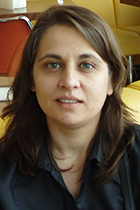
EVANGELIA D. CHRYSINA
Institute of Biology, Medicinal Chemistry and Biotechnology, NHRF, Greece
Evangelia D. Chrysina is Chemical Engineer (NTUA graduate, 1996) with a PhD in Biochemistry (awarded by the University of Bath, UK in 2000, Marie Curie Fellow). She worked as a Research officer at the Univ. of Bath and returned to NHRF in 2001 as Reintegrated Researcher from abroad where she spent four years. She worked as a freelance writer for the «Technology Marketplace» at INTRASOFT Intl. S.A. Since 2006 she is Researcher at NHRF. Since 2014, she is also Associate Professor (Docent) in Biomedicine, Faculty of Medicine & Health at Örebro University, Sweden. Her research focuses on Structural Biology and structure-based ligand design with applications in Health and Biotechnology employing mainly X-ray crystallography and integrated approaches. Her results on protein structure function relationships appear in peer-reviewed scientific journals and >120 entries in the Protein Data Bank for complex structures of glycogen phosphorylase with potential antidiabetic agents and new structures of biocatalysts involved in industrial processes. Her research has been supported by European & National funds as well as the industrial sector. Since 2008, she is the scientific point of contact of the ESFRI project «INSTRUCT» for Greece and coordinates the national distributed Research Infrastructure for Structural Biology «INSTRUCT-EL». She has (co)organised national and international conferences/workshops on structural biology, drug design and molecular modelling and she is teaching structural bioinformatics in the “Information Technologies in Medicine and Biology” MSc course at the University of Athens.
Full CV: http://www.eie.gr/nhrf/institutes/iopc/cvs/cv-chrysina-en.pdf
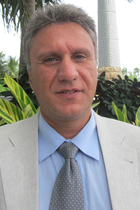
IOANNIS D. KOSTAS
Institute of Biology, Medicinal Chemistry and Biotechnology, NHRF, Athens
Dr. Ioannis D. Kostas (BSc in Chemistry, 1986; PhD in Organometallic Chemistry, 1991; post-doc: Free University / Amsterdam, and Max-Planck-Institut für Kohlenforschung) is currently “Research Director” at the Institute of Biology, Medicinal Chemistry and Biotechnology of the National Hellenic Research Foundation in Athens. His research interests are focused on transition metal catalysis and medicinal chemistry. One of his catalysts (CAS no. 219954-63-9) is commercially available (e.g. by SIGMA-ALDRICH). He has been coordinator or participant in 20 European and National competitive programs. He has been invited as a reviewer for proposals and fellowships within National, European and American programmes, and for a number of papers (as well as Editor in Chief) by 38 scientific journals. He has also been member of the Editorial Advisory Board in 6 scientific journals.
Full CV: http://www.eie.gr/nhrf/institutes/iopc/cvs/cv-kostas-en.pdf

THEODORA CALOGEROPOULOU
Institute of Biology, Medicinal Chemistry and Biotechnology, NHRF, Greece
Dr Theodora Calogeropoulou Research Director, with >20 years experience in medicinal chemistry. She received her Bachelor’s degree in Chemistry from the University of Athens (1983), and her Ph.D. degree from the Department of Chemistry, University of Iowa, USA (1987). She served as a Postdoctoral Research Associate at Scripps Research Institute, San Diego, USA and at the R&D of Viochrom SA and then joined NHRF. Her research interests involve the design and synthesis of biologically active molecules against parasitic and neurodegenerative diseases and cancer and the design and synthesis of fluorescent bioactive compounds and probes for mechanistic studies and imaging. A parallel research activity involves the development of synthetic methodology using conventional techniques and microwave or ultrasound irradiation. Her research is supported by European and National grants 28 grants (12 of them as coordinator) >2.5 mil euros. She is co-inventor of 8 international patents, has organised national and international meetings, delivered reviews for >15 chemistry journals and served as vice-chair for EU expert evaluator grant committees. She has trained >30 junior scientists (Postdocs, PhD, MSs, Diploma students).
Full CV: http://www.eie.gr/nhrf/institutes/iopc/cvs/cv-calogeropoulou-en.pdf
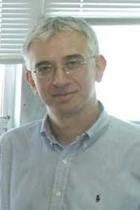
STATHIS GONOS
Institute of Biology, Medicinal Chemistry and Biotechnology, NHRF, Greece
Dr Efstathios Gonos, Director of Research at IBMCB/NHRF, graduated from the Department of Pharmacy, University of Athens, Greece, obtained his Ph.D. at the Department of Biochemistry, University of Glasgow, Britain and a Docent in Biomedicine at the Orebro University, Medical School, Sweden. His research (110 articles, 4 patents) focuses on the genetic and environmental factors that are linked to human aging and longevity. Dr Gonos has been a ''Senior expert'' of E.U. in ''Human development and the aging process'' and Deputy National Representative of Greece in E.U. in ''Genomics and Biotechnology for Health'' as well as member of the Advanced Course Committee of Federation of European Biochemical Societies (FEBS). He is member of the Executive Committee of International Union of Biochemistry and Molecular Biology (IUBMB) and Editor-in-Chief of ''Mechanisms of Aging & Development''
Full CV: http://www.eie.gr/nhrf/institutes/ibrb/programmes/molcelageing-en.html
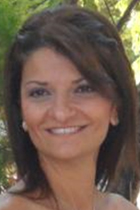
NIKI CHONDROGIANNI
Institute of Biology, Medicinal Chemistry and Biotechnology, NHRF, Greece
Niki Chondrogianni is a Research Associate Professor at the National Hellenic Research Foundation (NHRF). She obtained her PhD in Biochemistry and Molecular Biology from the University of Athens. She conducted her post-doctoral studies at the NHRF while she was trained in the use of the model organism C. elegans at the Institute of Molecular Biology and Biotechnology, FORTH in Crete. She focuses on the identification of genetic and environmental factors that govern aging, longevity and age-related diseases with emphasis on the regulation of the proteasome using C. elegans and human primary cells as models. She is a national and international patent holder that resulted in the development of novel anti-aging products that act through activation of the proteasome system (two relative product series are currently in the national and international market).
Full CV: http://www.eie.gr/nhrf/institutes/ibrb/cvs/cv-chondrogianni-gr.pdf
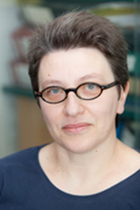
DIMITRA MITSIOU
Institute of Biology, Medicinal Chemistry and Biotechnology, NHRF, Greece
Dr Dimitra J. Mitsiou, PhD, is Research Assistant Professor at the Molecular Endocrinology Program of the IBMCB. She graduated from the University of Athens, Department of Biology in 1989 and obtained her PhD in Biology from the same Department in 1996. She worked as post-doctoral fellow at the University of Nijmegen, Department of Molecular Biology (1997-2001) and at the Institute of Biological Research and Biotechnology (IBRB, merged to IBMCB in 2012) of NHRF (2001-2005). In 2006, she was elected to a Research Lecturer position at IBRB and subsequently promoted to Research Assistant Professor in 2009. Her current research aims at deciphering the molecular mechanisms underlying various glucocorticoid receptor (GR) and estrogen receptor (ER) signaling pathways using genome-wide approaches. She recently previously reported on the crosstalk between GR and NFKB based on the genome-wide repertoire of their binding site and target genes. Her research also focuses on the development/discovery of selective GR agonists (SEGRAs) as putative drugs for inflammatory disorders and cancer. Her work is/was supported by grants from the European Community and the Greek General Secretariat of Research and Technology.
Full CV: http://www.eie.gr/nhrf/institutes/ibrb/cvs/cv-mitsiou-en.pdf
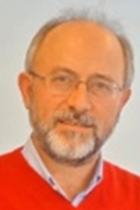
VASSILIS ZOUMPOURLIS
Institute of Biology, Medicinal Chemistry and Biotechnology, NHRF, Greece
Vassilis Zoumpourlis, PhD, is Research Professor and head of the Biomedical Applications Unit of IBMCB-NHRF. His research is aimed at i) the study of genes with a crucial function in the molecular mechanisms of multistage carcinogenesis (initiation, promotion, progression) and metastasis, ii) design of stem cell-based vehicles for effective and specific tumour targeting, and iii) the development of advanced in vitro preclinical assays for quick and reliable assessing of toxicology and safety profiles of pharmaceuticals. He has secured numerous grants during his carrier abroad and in Greece that were sufficient to support all his research activities for almost 25 years. He has collaborated with several Institutes, Universities and Pharmaceutical Industries in Greece and abroad. He published 71 peer-reviewed articles in international scientific journals. His scientific work has received over 3200 citations. He is the head of the certified animal facility of IBMCB-NHRF.
Full CV: http://www.eie.gr/nhrf/institutes/ibrb/cvs/cv-zoumpourlis-en.pdf
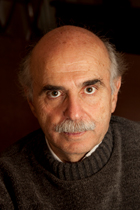
MICHAEL N. ALEXIS
Institute of Biology, Medicinal Chemistry and Biotechnology, NHRF, Greece
Michael N. Alexis, PhD, is Research Professor and head of the Molecular Endocrinology Team of IBMCB-NHRF and president of the Institutes’ Science Council. His research aims at, i) elucidating the prognostic and therapeutic significance of steroid receptors in endocrine-related cancer, ii) understanding the molecular determinants of breast cancer resistance to targeted drugs and, iii) developing Selective Estrogen Receptor Modulators with osteoprotective, neuroprotective and/or anticancer activities. His research was funded by GSRT-Greece, the EUREKA office and the EU. He served at the Hellenic Advisory Research Council and presently is member of the national panel of experts that elaborates on the research and innovation policy on “Biosciences, Health and Drugs”. He has collaborated with pharmaceutical industry in several competitively funded projects, published 65 peer-reviewed articles in international scientific journals and filed 6 patents.
Full CV: http://www.eie.gr/nhrf/institutes/ibrb/programmes/molendocrinology-en.html
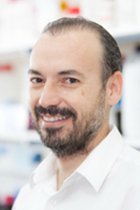
ARISTOTELIS CHATZIIOANNOU
Institute of Biology, Medicinal Chemistry and Biotechnology, NHRF, Greece
Aristotle Chatziioannou is member of the Institute of Biology, Medicinal Chemistry and Biotechnology, National Hellenic Research Foundation, Athens, (Principal Investigator) supervising the activities of the Metabolic Engineering and Bioinformatics Group. His research interests include in-silico biology, knowledge-mining in life sciences, genomic analysis, molecular pathway analysis, biological ontologies, bioinformatics, biostatistics, metabolic engineering, computational biology, and biomedical image processing. In light of this activity, he has served as Invited Professor during 2012-2013, for CNRS and INSERM at Bordeaux, France, in the area of Bioinformatics and Systems Biology. He is also founder of e-NIOS Applications PC, an NHRF spin-off SME, in the area of intelligent genomic analysis of complex biological data. He is the author or coauthor of more than 130 journal and international conference papers in these fields. He has participated actively in the strategic planning of research policies and their harmonization with the European and International Framework as Vice President of the Hellenic Union of Researchers (2 tenures, 2009-2015), and two tenures in the Board (Vice President) of the NHRF Personnel Association. Since January 2016, he is member of the Panel of Experts of the Hellenic National Committee of Research and Innovation that elaborates a National Roadmap for Research and Innovation Policy Planning in Greece and Substitute member at the Board of the Hellenic State Foundation of Scholarships.
Full CV: http://www.eie.gr/nhrf/institutes/ibrb/cvs/cv-chatziioannou-gr.pdf
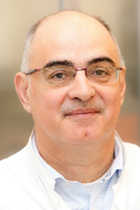
ALEXANDROS PINTZAS
Institute of Biology, Medicinal Chemistry and Biotechnology, NHRF, Greece
Alex Pintzas is Director of the Institute of Biology, Medicinal Chemistry and Biotechnology (NHRF). He worked as a Research Scientist at the CRC (currently CRUK) Beatson Institute for Cancer Research in Glasgow and in the CNRS-LGME (now IGBMC) in Strasbourg. He has been recipient of The EMBO Long Term post-doctoral fellowship and of The EU Marie Curie Fellowship. His research interests are in the scientific areas of Biology of Cancer and Cell Death, Cancer Chemoprevention and Therapeutics. His current research interests focus on drug discovery and include the analysis of genetic and epigenetic events associated with tumour progression and/or therapeutic responses to targeted anti-cancer drugs and their rational combinations to overcome resistance. He has been visiting researcher at academic institutions and pharmaceutical companies in Europe and the US. He has been co-ordinator/partner in several large European and Greek research funded programmes of many collaborating organizations on cancer biology and therapeutics.
Full CV: http://www.eie.gr/nhrf/institutes/ibrb/programmes/smgenexp-en.html
Venue
National Hellenic Research Foundation (N.H.R.F)
48 Vassileos Constantinou Avenue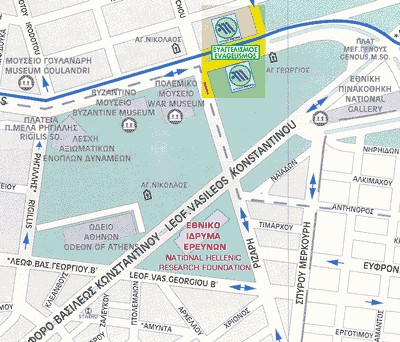
The building has two entrances: the first is located on Vassileos Constantinou Av (N. 48) and the second on Vassileos Georgiou str.
You can get to NHRF by:
![]() Bus
Bus
![]() 203, 204, 211, 214 (Bus stop: 2nd Rizari),
203, 204, 211, 214 (Bus stop: 2nd Rizari),
![]() 225 224 (Bus stop: Evangelismos)
225 224 (Bus stop: Evangelismos)
![]() 450, 550 (Bus stop: Rizari)
450, 550 (Bus stop: Rizari)
![]() 622 (Bus stop: Evangelismos)
622 (Bus stop: Evangelismos)
![]() 815 (Bus stop: Evangelismos)
815 (Bus stop: Evangelismos)
![]() Metro
Metro
Evangelismos station (Exit to Rizari)
![]() Trolleybus
Trolleybus
![]() from Patision St. Trolleybus 3 (Bus stop: Evangelismos, on Vas. Sophias Ave.)
from Patision St. Trolleybus 3 (Bus stop: Evangelismos, on Vas. Sophias Ave.)
![]() 8, 13 (Bus stop: Evangelismos, on Vas. Sophias Ave.)
8, 13 (Bus stop: Evangelismos, on Vas. Sophias Ave.)
See also :
OASA- Bus routes and timetables
Accomodation
For information on accommodation, please contact us.
Contact
For further information, please contact us by email at [email protected], or by phone (Mrs V.Kollia, +30 210 7273767)
Terms of Use | Privacy Policy | Cookies Policy | © National Hellenic Research Foundation